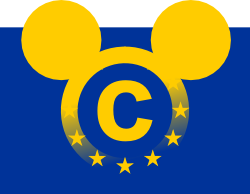The European Commission just launched a new consultation on its disastrously dogmatic report on IPRED, a directive on the enforcement of intellectual property rights, adopted by the EU in 2004. The report — whose logic is similar to ACTA — is based on an analysis of the application of IPRED. It calls for the massive filtering of the Internet to tackle file-sharing: according to the Commission, Internet Service Providers (ISPs) should “cooperate” in the war against sharing to avoid the threat of litigation.

(CC)BySa La Quadrature du Net
After the negotiations of ACTA, the Gallo Report adopted by the EU Parliament last September and the upcoming revival of the directive on the criminal enforcement of “intellectual property rights” (IPRED 2), this new report on IPRED is one more sign of the collusion between EU policy-makers and the copyright lobby. Clearly, the Commission is engaging in a major effort to toughen up copyright enforcement policies in the digital environment.
Why you should answer the consultation
Citizens and NGOs have until March 31st, 2011 to sent a submission to answer the consultation. Given the repressive stance of the Commission’s report, the participation of all is needed to denounce the absurdity and dangerousness of the measures pushed forward by the Commission. The copyright lobby have clearly influenced the content of this document, and policy-makers must be reminded that fundamental rights and the wider public interest must come first.
You can participate in the analysis by commenting both texts on co-ment: the IPRED report and the analysis of the application of IPRED. Warning: the analysis of the application of IPRED is only a “document of the Commission services” (it was not formally adopted by the Commission), but it contains many revealing extremist interpretations or suggestions. It is equally important to analyze it.
How to draft your submission?
It’s up totally to you:
- You can address the issues of your choice, as you are of course not required to answer all the points raised by the report.
- You can write in the language which you feel most comfortable with. Any language spoken in the European Union is acceptable.
- There is no requirement regarding the length of the document.
In a Nutshell: What is Wrong With the Report?
The report unfortunately:
- amalgamates a vague notion of “online IPR infringements” (including non-commercial ones) with physical goods counterfeiting (that poses real threat to consumers health and safety);
- calls for more repression in the name of dogmatic vision of the alleged prejudice caused by file-sharing, when many studies show that industry figures were all inflated, that positive impact of filesharing should be considered and prove that the prejudice is minimal or null. The report calls for a new criminal enforcement directive (IPRED2) and fails to make a balanced evaluation of the IPRED directive.
- calls for non-legislative measures to combat file-sharing. Such “non-legislative measures”, also called “voluntary agreements” had also described in a communication by the European Commission on “IPR enforcement” (dated Sept.11th 2009). They would amount to contractual sanctions against individuals doing not-for-profit file-sharing decided by rights-holders and cooperative ISPs: restrictions of access, targeted filtering, bandwidth cap, etc… This is literally an open door to private copyright police and justice.

